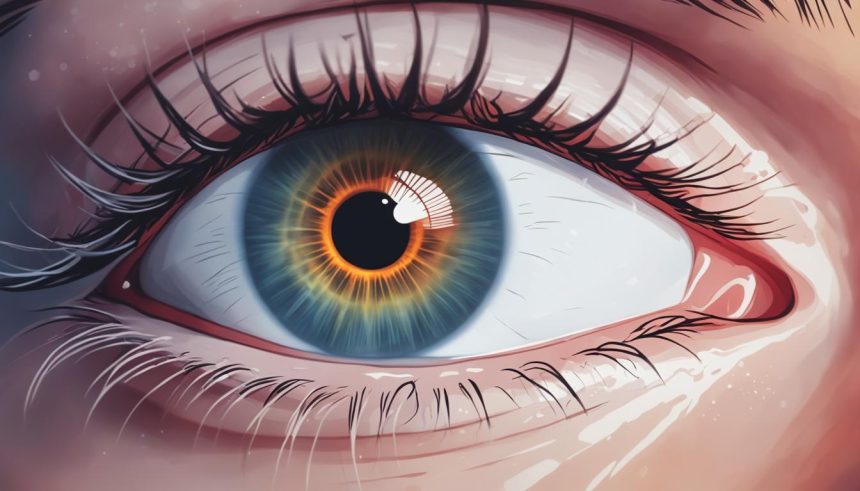Have you ever experienced an uncontrolled twitching or spasms in the muscles surrounding your left eye? This condition known as “left eye twitching” or “left eye jumping” can be a bothersome and uncomfortable experience. In this article, we will delve into the intriguing world of left eye twitching and explore its various interpretations. From superstitions and cultural beliefs to medical causes, we will uncover the potential meanings behind this common phenomenon.
- Left Eye Twitching: A Common Phenomenon
- Superstitions and Cultural Beliefs
- Left Eye Twitching in Folklore and Mythology
- Health Reasons for Left Eye Twitching
- Eye Strain and Fatigue
- Dry Eyes and Allergies
- Lack of Sleep and Fatigue
- Nutrition and Lifestyle Factors
- Neurological Conditions
- Eye Strain and Fatigue
- Dry Eyes and Allergies
- Lack of Sleep and Fatigue
- Nutrition and Lifestyle Factors
- Neurological Conditions
- When to Consult a Healthcare Professional
- Coping Strategies for Left Eye Twitching
- Debunking Left Eye Twitching Myths
- Conclusion
- FAQ
Left eye twitching is a widespread occurrence that many people experience at some point in their lives. However, it is often misunderstood due to the prevalence of superstitions surrounding it. In this section, we will discuss the causes of left eye twitching and separate fact from fiction regarding this common occurrence.
What does it mean when your left eye jumps? By exploring the various interpretations behind left eye twitching, we aim to provide a more comprehensive understanding of this intriguing phenomenon. So, join us as we embark on a journey to decode the mysteries of left eye twitching.
Left Eye Twitching: A Common Phenomenon
Left eye twitching is a prevalent occurrence that affects people worldwide. It is characterized by involuntary contractions in the muscles surrounding the left eye, causing a noticeable fluttering or twitching sensation. While the intensity and frequency of left eye twitching may vary from person to person, it is usually benign and temporary, resolving on its own.
Left eye twitching is often associated with superstitions and cultural myths about its spiritual meaning. Some people believe that left eye jumping is a sign of bad luck or impending doom, while others view it as a message from the spiritual realm. However, the causes behind left eye twitching can be both physiological and psychological.
The most common causes of left eye twitching include fatigue, stress, and eye strain. Lack of sleep and strenuous exercise may also trigger eye twitching. Nutrient deficiencies, allergies, and dry eyes are other potential causes of left eye twitching. In rare cases, left eye twitching may indicate an underlying neurological condition that requires medical attention.
To better understand the patterns of left eye twitching, we have created a table comparing the most prevalent causes of eye twitching:
As we can see from the table, several factors may contribute to left eye twitching, ranging from minor problems such as eye strain to more severe neurological conditions. However, in most cases, left eye twitching is a temporary condition that can be managed with lifestyle changes and home remedies.
In the next sections, we will delve deeper into the cultural interpretations of left eye twitching, as well as the health reasons for eye spasms and possible remedies for reducing discomfort.
Superstitions and Cultural Beliefs
Left eye twitching has intrigued people for centuries, and different cultures around the world have associated it with a variety of superstitions and cultural beliefs. Many believe that the left eye twitching is an omen of either good or bad luck, depending on the individual’s perspective.
In some cultures, left eye twitching is considered a sign that a visitor is about to arrive at your home, while in others, it’s regarded as a sign that a decease relative is trying to communicate with you from the afterlife. Some cultures associate the left eye with receiving, and the right eye with giving, leading to the belief that left eye twitching means you will receive unexpected wealth.
Left eye twitching has also been linked to astrology, with some people believing that it is a sign of planetary changes that will affect their lives. In India, left eye twitching is believed to be related to the movement of celestial bodies and is considered an important astrological indicator.
Throughout history, left eye twitching has also been a common element in folklore and mythology. In ancient Egypt, left eye twitching was believed to be a sign of good luck and prosperity, while in China, it was associated with a poor outcome or failure in one’s endeavors.
Superstitions and Cultural Beliefs Table:
| Region/Culture | Interpretation of Left Eye Twitching |
|---|---|
| Africa | A bad sign indicating an upcoming misfortune or illness |
| India | An astrological indicator that can signify gains or losses depending on the individual’s birth chart |
| China | Represents impending bad luck, particularly in terms of financial matters |
| Turkey | Positive indicator of joy and excitement, especially for women who are single |
| Italy | Indication of impending news, with a twitch in the lower eyelid representing good news and a twitch in the upper eyelid indicating bad news |
| Japan | Sign of eyestrain and overwork, with some believing it can signify the individual’s need for rest or vacation |
| Russia | Sign that you will soon be crying or shedding tears for some reason, whether it is due to sadness or happiness |
While these beliefs may seem far-fetched to some, they are an essential part of different cultures’ heritage and traditions. Regardless of whether you believe in the superstitions or cultural beliefs associated with left eye twitching, this phenomenon has captured the attention of many and remains a fascinating topic of discussion.
Left Eye Twitching in Folklore and Mythology
In folklore and mythology, left eye twitching has been associated with supernatural elements. Many cultures interpreted the phenomenon as an omen, either for good or bad luck. For example, in ancient Greek mythology, left eye twitching was thought to indicate impending misfortune.
Similarly, in Chinese culture, left eye twitching was believed to be linked to various superstitions. Some interpretations suggest it signifies an encounter with someone you have not seen in a long time, and others view it as forewarning of imminent bad news.
“If the left eye jerks more, it hints at the arrival of good fortune or unexpected income.”
In Indian culture, left eye twitching has been linked to spiritual meanings. It is believed that the left eye is the window to the soul, and eye twitching indicates a shift in spiritual energy. Some interpretations suggest a positive change in spiritual energy and a sign of new beginnings, while others view it as a warning of fleeting opportunities or the onset of bad luck.
Overall, the rich array of interpretations across cultures and mythologies highlights the significance placed on left eye twitching in various belief systems. Whether viewed as an omen or a message from the spiritual realm, left eye twitching continues to captivate our curiosity and imagination.
Health Reasons for Left Eye Twitching
While left eye twitching is often associated with superstitions and cultural beliefs, it can also have physiological causes. In this section, we will examine some common health conditions that may contribute to left eye twitching.
Eye Strain and Fatigue
One of the leading causes of left eye twitching is eye strain and fatigue. Prolonged periods of staring at screens or straining your eyes can lead to spasms in the eyelid muscles. It can be especially prevalent in the left eye due to the positioning of the ocular nerves. A simple solution is to follow the 20-20-20 rule. Every 20 minutes, take a 20-second break and look at something 20 feet away.
Dry Eyes and Allergies
Dry eyes and allergies can also lead to left eye twitching. In fact, allergic conjunctivitis affects the left eye more frequently than the right. Both conditions cause irritation and inflammation, resulting in muscle spasms around the eyes. You can alleviate the symptoms by avoiding allergens and using eye drops.
Lack of Sleep and Fatigue
Insufficient sleep and chronic fatigue can be a significant contributor to left eye twitching. Lack of sleep can lead to a host of health issues, including muscle spasms and twitches. Getting enough restful sleep is essential for overall health and reducing the frequency of eye twitches.
Nutrition and Lifestyle Factors
Your diet and lifestyle can also play a significant role in left eye twitching. Nutritional deficiencies in magnesium and potassium can lead to muscle spasms, including those in the eyelids. Excessive caffeine intake and alcohol consumption can also trigger eye twitching. It’s important to maintain a balanced diet and reduce alcohol and caffeine consumption.
Neurological Conditions
In some cases, left eye twitching can be a symptom of underlying neurological conditions such as hemifacial spasms and blepharospasm. These conditions cause involuntary muscle contractions and require medical attention. Confer with a healthcare professional on addressing this problem.
Eye Strain and Fatigue
If you spend long hours working on a computer or mobile device, you may experience eye strain and fatigue. This can lead to left eye twitching, a common phenomenon that can be bothersome.
When you stare at a screen for a long time, your eyes become strained, and the muscles around them may contract involuntarily. This can cause left eye twitching. Factors that contribute to eye strain include brightness, glare, and inadequate viewing distance.
To prevent eye strain and reduce the likelihood of left eye twitching, take frequent breaks to rest your eyes. A helpful approach is the 20-20-20 rule: every 20 minutes, take a 20-second break to look at an object 20 feet away from you. Also, adjust the lighting and brightness of your screen to minimize glare.
An important aspect of preventing eye strain and fatigue is proper ergonomics. Ensure that your screen is positioned at the correct height and distance from your eyes. This prevents unnecessary neck and eye strain and promotes good posture.
By adopting healthy eye habits, such as reducing screen time, resting your eyes regularly, and being mindful of your posture, you can significantly reduce eye strain and prevent left eye twitching.
Dry Eyes and Allergies
Left eye twitching can also be caused by dry eyes and allergies. When the eyes become dry, they may feel irritated or gritty, leading to eye twitches. Allergies, on the other hand, can cause the eyes to become red, itchy, and watery, which can also trigger left eye twitching.
To alleviate the symptoms of dry eyes and allergies, there are various treatments available. Lubricating eye drops can help soothe dry eyes, while antihistamines and decongestants may provide relief from allergies. Additionally, maintaining a healthy diet rich in omega-3 fatty acids and staying hydrated can help prevent dry eyes.

For severe or persistent symptoms, it is important to seek medical advice and treatment.
Lack of Sleep and Fatigue
When it comes to left eye twitching, sleep deprivation and chronic fatigue can be common culprits. Our bodies require adequate rest in order to function properly, and sleep is particularly important for eye health. Lack of sleep can lead to exhaustion and strain on the eyes, which can trigger left eye twitching.
Studies have shown that adults should aim for 7-9 hours of sleep each night to maintain optimal health. However, this can vary depending on individual needs and circumstances. Quality of sleep is just as important as quantity, and factors such as room temperature, mattress comfort, and screen use can all impact the quality of our rest.
Combatting sleep deprivation may involve making changes to our sleep environment and habits. Some strategies for improving sleep quality include:
- Establishing a consistent sleep schedule
- Avoiding caffeine and alcohol before bedtime
- Engaging in relaxing activities before bed, such as reading or taking a warm bath
- Creating a comfortable sleep environment with proper lighting and temperature
Incorporating these habits can help minimize left eye twitching episodes caused by insufficient sleep, ultimately leading to improved overall eye health and function.
Nutrition and Lifestyle Factors
Certain nutrition and lifestyle factors can contribute to left eye twitching, though their impact varies depending on the person. Here, we will explore some of the most common triggers and provide tips for maintaining balance.
Nutritional Deficiencies
Poor nutrition can affect eye health and cause left eye twitching. Specifically, deficiencies in magnesium, potassium, and vitamin B12 can trigger eye twitches. To address these deficiencies, consider incorporating foods high in these nutrients into your diet.
- Magnesium: Spinach, almonds, avocado, dark chocolate, black beans
- Potassium: Bananas, sweet potatoes, yogurt, tomatoes, oranges
- Vitamin B12: Beef, chicken, fish, eggs, dairy products
Excessive Caffeine and Alcohol Intake
Drinking large amounts of caffeine and alcohol can overstimulate the nervous system, leading to left eye twitching. To reduce the risk, aim to limit your intake to one or two servings per day. Try replacing these beverages with water or herbal tea to stay hydrated and calm.
Stress and Fatigue
Stress and fatigue can also contribute to left eye twitching. Finding ways to manage stress, such as meditation or deep breathing exercises, can help. Getting enough sleep is also essential for maintaining eye health and reducing the frequency of eye twitches.
Quitting Smoking
Smoking can contribute to eye strain and dryness, leading to left eye twitching. Quitting smoking can help not only reduce this symptom but also lower the risk of various eye diseases.
Neurological Conditions
In rare cases, left eye twitching may be a result of an underlying neurological condition. These conditions affect the nerves that control the muscles of the face and eyes, causing involuntary twitches or spasms.
One such condition is hemifacial spasm, which is characterized by spasms on one side of the face, including the muscles surrounding the eye. The spasms can start as infrequent, brief twitches that may eventually become frequent and painful.
Blepharospasm is another neurological condition that may cause left eye twitching. It is characterized by involuntary contractions of the eyelid muscles, leading to excessive blinking or closing of the eyes.
If left eye twitching persists or is accompanied by other symptoms, such as difficulty speaking or facial weakness, it is crucial to seek medical attention promptly. A neurologist can perform an evaluation and determine the underlying cause of the eye twitching. Treatment options may include botulinum injections or surgery.
When to Consult a Healthcare Professional
While left eye twitching is usually benign and temporary, persistent or concerning eye twitches may warrant a visit to a healthcare professional. Some red flags to watch out for include:
- Twitching that lasts longer than a few weeks
- Twitching that involves other parts of the face
- Twitching accompanied by other symptoms, such as pain or vision changes
If you experience any of these symptoms or have concerns about your left eye twitching, it is important to seek medical advice. A healthcare professional can assess your symptoms and determine if there is an underlying health condition contributing to your eye twitching.
Coping Strategies for Left Eye Twitching
If you are experiencing left eye twitching, there are various coping strategies and home remedies that may provide relief and reduce the frequency of the twitches. We suggest trying the following techniques:
- Relaxation techniques: Stress is often a contributing factor to left eye twitching. Therefore, it is important to take measures to reduce stress. Consider practicing meditation, yoga, or deep breathing exercises to promote relaxation.
- Eye exercises: Simple eye exercises, such as focusing on distant objects or massaging the eyelids, can help alleviate eye strain and reduce the likelihood of left eye twitching.
- Caffeine reduction: In some cases, excessive caffeine consumption can trigger left eye twitching. Try reducing your caffeine intake by replacing coffee or soda with water or herbal tea.
- Warm compress: Applying a warm compress to the affected eye can help soothe muscle irritation and reduce the frequency of eye spasms.
Remember, if left eye twitching persists and disrupts your daily routine, it is important to consult a healthcare professional to rule out any underlying medical conditions.
Debunking Left Eye Twitching Myths
Left eye twitching has attracted a broad range of superstitions and cultural beliefs, ranging from the harmless left eye jumping superstition to more serious left eye twitching omen interpretations. However, despite the prevalence of these myths, many of them are unfounded.
Myth: Left eye twitching signifies money troubles.
Fact: There is no scientific evidence to support this belief. Left eye twitching is often a temporary condition caused by a range of factors such as eye strain or fatigue, rather than a harbinger of financial difficulties.
Myth: Left eye twitching is a warning of impending disaster.
Fact: While many cultures interpret left eye twitching as an omen, there is no concrete evidence to support this claim. It is more likely to be caused by physical strains or conditions rather than a warning sign of a forthcoming negative event.
It is important to remain skeptical about the various interpretations and superstitions associated with left eye twitching and maintain a more rational understanding of this phenomenon. By doing so, we can approach the situation more objectively and avoid undue anxiety or distress.
Conclusion
Left eye twitching is a complex phenomenon that has been associated with various interpretations throughout history. While cultural beliefs and superstitions provide unique insights, it is important to recognize that left eye twitching can have physiological causes that require medical attention.
By exploring the potential meanings behind left eye twitches, we hope to provide a more comprehensive understanding of this phenomenon. It is important to note that in most cases, left eye twitching is benign and temporary. However, if you experience persistent or concerning eye twitches, it is essential to seek medical advice to rule out any underlying conditions.
We hope that this article has shed light on the fascinating world of left eye twitching and provided practical coping strategies for those experiencing discomfort. Remember to take care of your eye health and seek medical attention when necessary. Thank you for reading our article on the meaning of left eye twitching.
FAQ
What does it mean when your left eye jumps?
Left eye twitching, also known as myokymia, is a common occurrence characterized by involuntary spasms in the muscles surrounding the left eye. It can be caused by various factors, including stress, eye strain, fatigue, and even neurological conditions. While the specific meaning behind left eye twitching may vary depending on cultural beliefs and superstitions, it is generally considered a benign and temporary phenomenon.
Are there any superstitions associated with left eye twitching?
Yes, there are several superstitions and cultural beliefs connected to left eye twitching. It is often regarded as a sign of impending events or a message from the spiritual realm. In some cultures, left eye twitching is considered an omen of good luck or a precursor to an unexpected visitor. However, it is crucial to remember that these interpretations are rooted in folklore and may not have any scientific basis.
What are the common causes of left eye twitching?
Left eye twitching can be triggered by various factors, including eye strain, fatigue, dry eyes, allergies, lack of sleep, nutritional deficiencies, excessive caffeine intake, and certain neurological conditions like hemifacial spasms or blepharospasm. Identifying and addressing the underlying cause can help alleviate and reduce the frequency of eye twitches.






